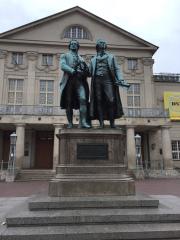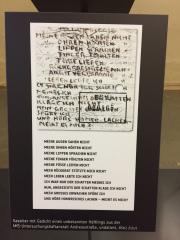I am in Erfurt, Germany, to preach at the Reformation Day service in the Augustinerkirche where Martin Luther studied at the university and became a monk. Having arrived on Friday, we have had a packed programme, including a brilliant (though largely incomprehensible) concert in the Michaeliskirche last night – great guitar playing, especially), meetings with groups of people, a visit to a 'pilgrim church' at Schmira, a day in Weimar, and a visit to the former Stasi prison in the Andreasstraße in Erfurt today.

Yesterday was my first visit to Weimar. This is the place where in 1919 the constitution was drawn up that gave its name to the republic that was created in the humiliating aftermath of defeat in World War One. Yet it is also the place where Goethe, Schiller, Herder and Nietzsche spent their finest and most productive years. Here the culture of what became known as the Enlightenment flourished.
(An aside: one of the best stories we heard was of the pastor of the church in the center where we attended the morning service. In the sacristy there is a portrait of him. His name was Wessel and he came from an upper-class line of distinguished clergy and military officers. When during the War the poor of Weimar couldn't afford a Christmas tree or presents for their children, he put a “tree for everyone” on the steps of the church and got gifts for the children of the town. He supported Hitler at the beginning, but gradually saw where it was all heading. He resisted and eventually was sent to Buchenwald. He survived only because Hitler pardoned him, leaving him to return to Weimar a da totally broken man. Why did Hitler pardon him? Because he was related to Horst Wessel, whose song – the Horst Wessel Lied – became almost the national anthem of the Nazis. Resistance was brutal and costly.)
The Enlightenment flourished partly as a reaction to the horrendous bloodshed in conflicts that were rooted in the sorts of religious and political power games that emanated from the Reformation. Never again should religion be allowed space in the political sphere: reason and rationality should thenceforth define genuine humanity and humanism. It is not hard to follow the logic and the sentiment. Speaking of Martin Luther today in the Augustinerkirche, there also had to be an acknowledgement of the less-than-gracious elements of his character, to say nothing of his appalling antisemitism. (Like his bowel problems, it got worse as he got older.)
Yet, getting rid of religion in favour of faith in rationalism did not quite go according to plan, did it.
The train from Erfurt to Weimar takes you past Buchenwald. Just around the corner from the famous statue of Goethe and Schiller in front of the theater in Weimar is the hotel where Adolf Hitler was greeted by the idolatrous crowds that claimed the poets and Herder as their intellectual and cultural heritage.

My point is simple. The problem of the human bias to destructiveness is evidenced in religious conflict and the lust for power at any level. It is not cured by rationalism. How is that the culture, philosophy and idealism of Goethe, Schiller, Herder, etc. was so easily corrupted within a century or less by a populace drawn to populism, fascism and mass slaughter?
If the bloodbaths of religious wars in Europe led to a better way, then that better way also led to Buchenwald and the Stasi. Now listen to the rhetoric of the far right wing groups springing up in Germany and across Europe, blending the language of dehumanising hate under the guise of “cultural realism”.

